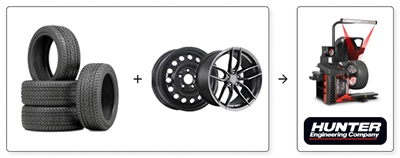How to choose the right winter tires for your SUV in 2024? - Complete Guide

Winter brings challenging driving conditions. For SUV drivers, choosing the right winter tires is crucial to ensure safety and efficiency. At PMCtire.com, we offer comprehensive advice to help you select the best winter tires for your vehicle.
Why Choose Winter Tires for an SUV?
Improved Grip
Temperature: Winter tires are specially designed with advanced rubber compounds that do not harden in extreme cold. This feature is essential because tires that remain flexible in cold weather maintain better contact with the road surface, thus providing superior grip and handling. Examples of winter tires include the Bridgestone Blizzak WS90 and the Michelin X-Ice Snow. Unlike all-season or summer tires, which can become rigid and less effective at temperatures below 7°C, winter tires maintain their flexibility even in severe freezing conditions.
Snow Grip: Winter tires for SUVs feature special tread patterns and additional sipes to effectively bite into snow and ice. These features increase the contact area between the tire and the road, resulting in better traction. Increased traction is especially important for SUVs, which due to their greater weight and size, might otherwise have difficulty stopping and maneuvering safely on snowy or icy surfaces. Models like the Pirelli Scorpion Winter 2 and the Continental VikingContact 7 are designed to offer superior performance. The sipes act like small cleats that grip the road surface, allowing for more precise control and significantly reducing the risk of skidding in winter conditions.
Choosing winter tires for your SUV not only increases safety but also enhances driving comfort in winter, ensuring better vehicle response to steering commands and a noticeable reduction in braking distance on cold and slippery surfaces. The Bridgestone Blizzak DM-V2 is another excellent choice for those looking to maximize these benefits.
Optimal Traction
Traction is a key factor for safe driving in winter, especially for SUVs.
Tread Technology: Winter tires for SUVs have tread patterns specially designed to maximize traction in various winter conditions. These treads are deeper and feature complex patterns that help channel water, slush, and mud away from the main contact surface of the tire. For example, the Bridgestone Blizzak WS90 uses a unique multi-cellular tread technology that improves traction on ice. The Michelin X-Ice Snow, on the other hand, adopts a flexible sipe tread design for enhanced grip on snow and ice. This design helps prevent hydroplaning, a dangerous phenomenon where the vehicle loses contact with the road and uncontrollably slides on a layer of water. Models like the Pirelli Scorpion Winter 2 and the Continental VikingContact 7 also offer advanced tread technologies, with optimized patterns to efficiently evacuate water and snow, allowing for better grip and quicker response to driving commands, essential for maneuvering an SUV safely in winter conditions. These technologies from the mentioned models significantly improve the safety and performance of winter tires for SUVs.
Choosing the Right Winter Tires for Your SUV
Selecting the appropriate winter tires for your SUV depends on several factors, including the climatic conditions of your region and your driving style.
Studded or Non-Studded
Ice Conditions: Studded tires are equipped with small metal studs embedded in the tread, providing exceptional grip on pure ice. Models such as the Michelin X-Ice North 4 and the Continental IceContact XTRM are particularly effective in regions where roads are often covered in ice. However, these tires can be noisy and offer reduced driving comfort on dry or paved roads. Moreover, they are prohibited or restricted in some areas due to their potential to deteriorate road surfaces.
Versatility: Non-studded tires, on the other hand, are designed to provide good grip on snow and ice without the use of studs. They are generally quieter and offer a more comfortable ride on dry or slightly snowy roads. These tires use advanced rubber compounds and special tread patterns to create friction and increased grip on cold and slippery surfaces. Their versatility makes them suitable for a wide range of winter conditions, making them a popular choice for drivers who encounter different types of road conditions in winter.
Adequate Size
Tire size is a crucial aspect to ensure performance and safety of your SUV in winter.
Compatibility: It is imperative to choose tires that exactly match the specifications of your SUV. Inappropriately sized tires can negatively affect the vehicle's handling and braking ability. Tires that are too large can cause friction problems against the fenders or other parts of the vehicle, while tires that are too small can reduce braking efficiency and impair steering accuracy. The correct size ensures that the tires provide an optimal contact surface with the road, essential for good traction and effective vehicle control in various winter conditions. At PMCtire, we provide a vehicle selection tool. By simply entering the model of your car, this tool will help you find only the tires that are compatible with your vehicle.
Important Features of Winter Tires for SUVs
Load Capacity
The weight and size of an SUV require tires capable of supporting a significant load.
Appropriate Choice: The tires of your SUV should be selected not only based on their size but also their ability to support the weight of the vehicle. Choosing tires with adequate load capacity is crucial for safety. Tires unable to support the weight of the SUV can wear out more quickly and be more susceptible to damage, such as blowouts or deformations. Moreover, tires properly sized for the load ensure better vehicle stability, an important factor for SUVs with a higher center of gravity. At PMCtire, the tires we offer are always compatible with your vehicle, that's our 100% compatibility guarantee.
Durability
The robustness of winter tires is essential to face the rigors of winter.
Wear Resistance: Look for winter tires designed to withstand the harsh winter conditions, such as extreme temperatures, abrasive snow, and de-icing salt. For example, the Goodyear WinterCommand Ultra is specially adapted for these challenges, offering increased resistance in these extreme conditions. Good durability means that the tires will retain their performance properties throughout the season and beyond. Durable tires, like the Michelin X-Ice Snow and the Continental VikingContact 7, offer not only better value for money but also contribute to safety by maintaining consistent performance throughout their lifespan. Features such as reinforced rubber compounds and robust tread structures are indicators of tires designed to last.
Installation and Maintenance of Winter Tires
Professional Installation
Balancing and Alignment: Entrusting the installation of your winter tires to professionals is crucial to ensure their correct balancing and alignment. Improper balancing can lead to vibrations and irregular tire wear, while poor alignment can cause premature tread wear and affect handling. Professionals will use specialized equipment to ensure that the tires are properly mounted on the rims and that their balance is optimal for a stable and comfortable ride.
Regular Checks
Tire Pressure: The pressure of winter tires should be checked regularly, as it is likely to fluctuate with temperature changes. Incorrect tire pressure can affect traction, handling, and even increase fuel consumption. It is recommended to check the pressure at least once a month and before long trips. Be sure to follow your SUV manufacturer's pressure recommendations for optimal performance.
Tips for Winter Driving with an SUV
Winter driving requires a cautious approach adapted to changing climatic conditions.
Climate Adaptation
Driving Style: It is important to adapt your speed and driving style to winter road conditions. Reduce your speed in snow or ice, and leave more distance than usual between your vehicle and the one ahead. Avoid sudden maneuvers, accelerate and brake gently to maintain control of your SUV.
Caution and Anticipation
Preparation: It is wise to keep an emergency kit in your vehicle, including items such as a first aid kit, a flashlight, blankets, and non-perishable food. Additionally, always check the weather forecast before leaving and plan your trips accordingly. If weather conditions seem too dangerous, consider postponing your trip.
Conclusion
At PMCtire.com, our commitment is to accompany you in finding the winter tires most suitable for your SUV. We understand that each vehicle and each driver has unique needs, especially regarding safety and performance in winter. That's why our team of experts is dedicated to providing you with personalized advice and precise recommendations, based on a thorough analysis of your specific requirements and the climatic conditions of your region.
Our wide selection of winter tires ensures you find the ideal product, whether you're looking for tires for extreme snow conditions, ice, or simply for low winter temperatures. We offer options for all budgets and preferences, ranging from the most recognized brands to quality economical alternatives.
By choosing PMCtire.com, you not only benefit from a wide choice of quality products but also from exceptional customer service, ready to answer all your questions and guide you in your purchase. Visit our site to explore our range, take advantage of our expert advice, and find the winter tires that will ensure the best driving experience for you and your SUV this winter.


